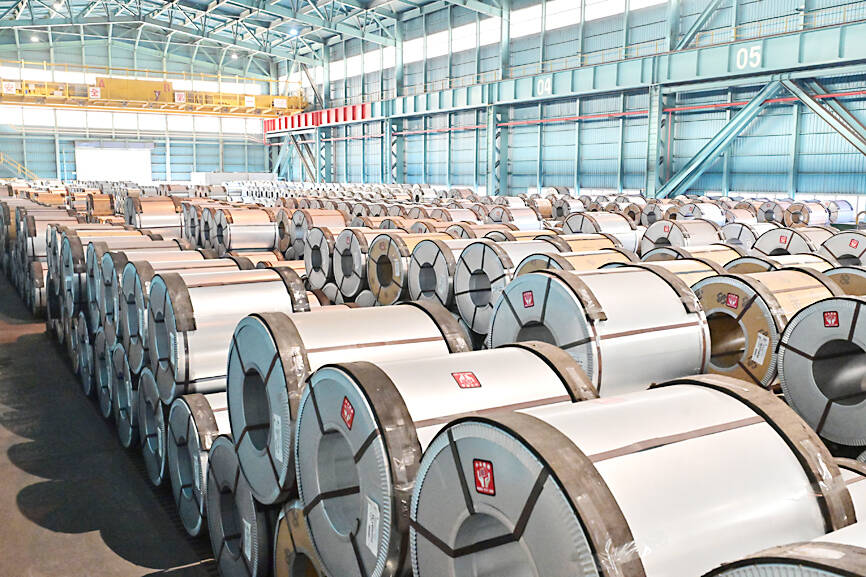China Steel Corp (CSC, 中鋼), the nation’s biggest steelmaker, yesterday said it is holding steady steel prices for domestic delivery next month and next quarter, as the global steel industry’s recovery is taking shape amid an improving world economy next year.
Before the arrival of a major pickup, the Kaohsiung-based company said steel demand would be muted during the first quarter of next year due to seasonal weakness and the arrival of Lunar New Year holidays.
Customers are taking a wait-and-see approach before US president-elect Donald Trump takes office next month, given uncertainty about the US’ new trade policy, CSC said in a statement.

Photo courtesy of China Steel Corp
The industry is hopefully heading to a recovery next year, snapping two straight years of contractions, attributable to a healther supply-demand situation, the steel company said.
Global steel demand is to rise 1.2 percent annually to 1.77 billion tonnes next year, driven by easing monetary policies in Europe and new economic stimulus packages launched by Beijing, CSC said yesterday, citing a forecast made by the World Steel Association.
In Taiwan, industrial production expanded for an 8th consecutive month last month, boosting demand for more manufacturing facilities, machinery equipment and servers, CSC said.
On the supply side, new signs showed a potential tight supply in China, the world’s biggest steel producer and consumer, CSC said.
Data compiled by the China Iron and Steel Association (中國鋼鐵工業協會) showed that crude steel inventories in China have fallen 11.8 percent year-on-year as of the first half of this month, reaching the lowest level since 2020, CSC said.
Overall, the world steel industry is currently going through a correction, CSC said.
Before the arrival of a solid pickup, China Steel plans to keep steel prices flat for domestic customers during the upcoming quarter in an effort to help downstream customers better manage their raw material costs, the company said in the statement.
In China, China Baowu Steel Group Corp (寶武鋼鐵集), the world’s largest steel company, and Angang Steel Co (鞍本鋼鐵) have hiked steel plate prices for delivery next month after prices for hot-rolled steel jumped as an improving Chinese economy spurred steel demand, CSC said. The price hikes would help bolster steel price quotes in the Asian market, it said.
CSC in a separate statement said that its pre-tax profits surged 41 percent year-on-year to NT$3.75 billion (US$114.8 million) during the first 10 months of this year, thanks to significant gains from mining investment.
However, operating profit tumbled 34 percent to NT$944.5 million during the 10-month period ending in October, it said.
Revenue dropped 1 percent year-on-year to NT$301.88 billion, it added.

LIMITED IMPACT: Investor confidence was likely sustained by its relatively small exposure to the Chinese market, as only less advanced chips are made in Nanjing Taiwan Semiconductor Manufacturing Co (TSMC, 台積電) saw its stock price close steady yesterday in a sign that the loss of the validated end user (VEU) status for its Nanjing, China, fab should have a mild impact on the world’s biggest contract chipmaker financially and technologically. Media reports about the waiver loss sent TSMC down 1.29 percent during the early trading session yesterday, but the stock soon regained strength and ended at NT$1,160, unchanged from Tuesday. Investors’ confidence in TSMC was likely built on its relatively small exposure to the Chinese market, as Chinese customers contributed about 9 percent to TSMC’s revenue last

With this year’s Semicon Taiwan trade show set to kick off on Wednesday, market attention has turned to the mass production of advanced packaging technologies and capacity expansion in Taiwan and the US. With traditional scaling reaching physical limits, heterogeneous integration and packaging technologies have emerged as key solutions. Surging demand for artificial intelligence (AI), high-performance computing (HPC) and high-bandwidth memory (HBM) chips has put technologies such as chip-on-wafer-on-substrate (CoWoS), integrated fan-out (InFO), system on integrated chips (SoIC), 3D IC and fan-out panel-level packaging (FOPLP) at the center of semiconductor innovation, making them a major focus at this year’s trade show, according

DEBUT: The trade show is to feature 17 national pavilions, a new high for the event, including from Canada, Costa Rica, Lithuania, Sweden and Vietnam for the first time The Semicon Taiwan trade show, which opens on Wednesday, is expected to see a new high in the number of exhibitors and visitors from around the world, said its organizer, SEMI, which has described the annual event as the “Olympics of the semiconductor industry.” SEMI, which represents companies in the electronics manufacturing and design supply chain, and touts the annual exhibition as the most influential semiconductor trade show in the world, said more than 1,200 enterprises from 56 countries are to showcase their innovations across more than 4,100 booths, and that the event could attract 100,000 visitors. This year’s event features 17

Germany is to establish its first-ever national pavilion at Semicon Taiwan, which starts tomorrow in Taipei, as the country looks to raise its profile and deepen semiconductor ties with Taiwan as global chip demand accelerates. Martin Mayer, a semiconductor investment expert at Germany Trade & Invest (GTAI), Germany’s international economic promotion agency, said before leaving for Taiwan that the nation is a crucial partner in developing Germany’s semiconductor ecosystem. Germany’s debut at the international semiconductor exhibition in Taipei aims to “show presence” and signal its commitment to semiconductors, while building trust with Taiwanese companies, government and industry associations, he said. “The best outcome